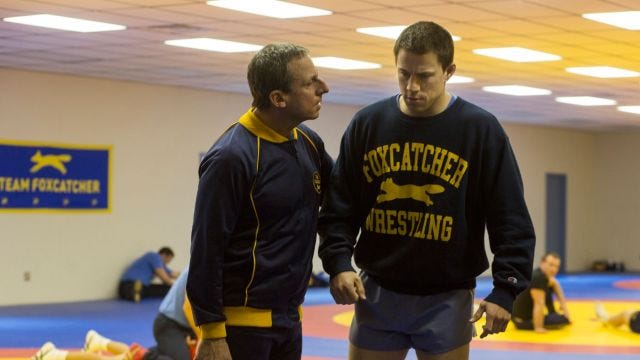Foxcatcher

"Foxcatcher” is far from a typical sports drama. That becomes painfully clear in a scene wherein chemical-fortune heir John du Pont — an unrecognizable Steve Carell — sits in his cold, sterile mansion, watching a documentary about his work with a U.S. wrestling team. Packed with patriotic speeches and uplifting embraces, it tells the kind of inspirational Oscar-bait story that du Pont wanted his life to be. As the sappy video echoes through du Pont’s dark, lonely palace, director Bennett Miller seems to be giving viewers the stark reminder that truth is stranger than fiction and that they are miles away from safe, warm Academy Award territory.
This is Miller’s third reminder of that striking notion. His first film, “Capote,” tells of a literary success spurred by murder; “Moneyball” follows a baseball coach who tried to strip the sport of sentimentality; and “Foxcatcher” looks at two Olympic athletes who ended up wrestling with their coach’s demons. It’s Miller’s best film yet — a masterpiece of mood that subverts expectations of explosive moments and steadily simmers under your skin. Working from E. Max Frye and Dan Futterman’s spare script, Miller creates an intimate, unnerving atmosphere and draws magnetic performances from Carell, Channing Tatum, and Mark Ruffalo.
The true story starts with Olympic gold-winning wrestler Mark Schultz (Tatum). We learn everything we need to know about him through his movement early in the film: slogging up the stairs to his apartment, hunching over a bowl of ramen, head-butting his brother, Dave (Ruffalo), during a training session.
Eager to step out of his brother’s shadow, Mark is easily seduced by an invitation to train on du Pont’s estate as part of a national wrestling team preparing for the 1988 Seoul Olympics.
Mark is initially infected by du Pont’s desire to “see the country soar again.” And for a while, the film is propelled by the same grand visions of America. An early scene finds Mark and du Pont looking out over Valley Forge — the site of the Continental Army’s camp over the winter of 1777-78 during the Revolutionary War. Much like the athletic facility on du Pont’s nearby farm, this sacred ground was a refuge for fighters that became a place of death and despair. Du Pont’s talk of the sacrifices made there serves as inspiration for Mark — and eerie foreshadowing of events to come.
Du Pont killed Mark’s brother in January of 1996, not far from that historic site of similar, wintry hardship.
As “Foxcatcher” crawls to this grisly conclusion, a thick air of dread looms over the film like the fog floating above the fields of the du Pont farm. Miller bravely keeps the movie subdued and viewers on edge with two-plus hours of calm before the storm. Cinematographer Greig Fraser maintains an unsettling stillness while composer Rob Simonsen’s strings slowly rumble like soft rolls of thunder.
In an interview with David Poland of Movie City News, Carell said the understated style of the film has the same effect as “when somebody whispers, and it makes you come in much closer.” The film evokes that kind of intimacy, especially near the end. Like “Citizen Kane,” it’s an epic tale of American ambition that culminates into a smaller story of innocence lost.
In the second half of the film, du Pont seems less motivated by lofty, patriotic ideals and driven more as the unhappy boy of an oppressive mother (a chilly Vanessa Redgrave). For him, happiness is like an award he cannot touch on his mother’s glass trophy case. And that’s how Carell portrays him — as an awkward boy in a room of fragile valuables, desperate to play. Carell's innocent eyes and thick prosthetic makeup underscore the idea that du Pont is a troubled child in the shell of an old scion. He’s always looking past his aristocratic beak nose, searching for a down-to-earth life below the asphyxiating air of the elite. A particularly poignant scene finds him watching Dave Schultz play with his children in a messy hotel room, standing back and observing with both admiration and envy. A lonely, socially inept man driven out of insecurity, he’s not terribly unlike Carell’s character in “The Office.”
Like the film, Carell’s performance sneaks up quietly and floors you. Tatum and Ruffalo are equally effective, doing a lot with little dialogue. Just as Carell shows a youthful sense of sadness beneath his upper-class sheen, Tatum plays Mark as a wounded child with the body of a hulk. His eyes are perpetually lost and desperately searching. Ruffalo plays Dave as a hesitant big brother with thoughts of concern constantly on the tip of his tongue.
Like these characters, “Foxcatcher” slowly boils. Despite its epic exterior, it has no explosive moments. Like the inspirational video playing in du Pont’s empty, ominous mansion, it’s a seemingly uplifting sports story shrouded in sorrow.
